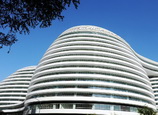
October but was flat compared with a month earlier, the Shanghai Statistics Bureau said yesterday.
Food costs, which account for nearly a third of the basket, rose by a slower 2.8 percent, compared with 3.5 percent in September. But prices of transport and healthcare grew by a faster pace.
"Similar to the national situation, inflation in Shanghai has been well controlled," said Li Maoyu, an analyst at Changjiang Securities Co.
China's Consumer Price Index eased to an almost three-year low of 1.7 percent last month.
In the first 10 months of this year, Shanghai's inflation grew by 3 percent, compared with the national average of 2.7 percent during the period.
The city's economy grew 7.4 percent on an annual basis in the first three quarters amid a higher comparative base, accelerated economic restructuring and more exposure to external markets.
Yan Jun, chief economist at the statistics bureau, said earlier that Shanghai may still realize the growth target of 8 percent this year.
But Xue Jun, an analyst at CITIC Securities, said it has become increasingly difficult to meet the target because of Shanghai's weak trade performance. The city's trade added 0.5 percent from a year ago to US$362.9 billion in the January-October period, slower than the national average pace of 6.3 percent, according to the General Administration of Customs.














 'Gangnam style' life of young rich in Chongqing
'Gangnam style' life of young rich in Chongqing


![]()
